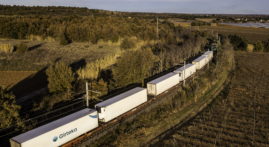The European logistics landscape faces frequent disruptions due to road blockages and other unforeseen events. These disruptions pose significant risks to the reliability of logistics supply chains, affecting not only local, but also regional and sometimes even global trade dynamics. To name the most impactful recent disruptions – the French and Polish farmers’ strikes that took place earlier this year. These two incidents stood out for causing alarming blockages on important national routes and border crossings. What costs were incurred and what strategic measures were taken by logistics leaders to ensure supply chain reliability?
Understanding the Landscape
Some route blockages cause temporary logistical challenges, others provoke long-term changes in supply chains and the overall economy of the globe. The latter case can be illustrated by the Suez Canal incident in 2021.
Back then, a football-pitch-length Evergreen container ship blocked one of the world’s busiest trade routes by running aground and getting lodged sideways across the waterway. This incident not only disrupted logistics chains but also created a ripple effect, causing oil prices to climb on international markets. It highlighted the fragility of the global supply chains in general.
Coming back to Europe, in January of this year, French farmers resorted to blocking highways between some of the country’s largest cities, such as Marseille and Lyon, while also dumping imported produce on the roads. In one case, dozens of tractors occupied the roads during the morning rush-hour on the southwestern edge of Paris.
Aside of blocking roads and border crossings, protestors also caused damage to infrastructure and logistics equipment, amplifying the impact on the supply chain. The farmers’ strikes included the destruction of toll booths and transport facilities, causing extensive logistical challenges.
The French farmers’ strikes affected:
- National and International Markets: Disruptions in the transport of goods to Spain, Italy, and other neighbouring countries.
- Logistics Costs: Damage to equipment and infrastructure increased repair and replacement expenses for logistics companies.
- Supply Chain Reliability: Repeated disruptions undermined the confidence of clients and suppliers in the reliability of affected logistics services.
In another significant incident in February 2024, Polish farmers also initiated a campaign of road blockades across Poland. Their aim, much like the French farmers’, was to protest the European Union’s (EU) agricultural policies and inadequate government support. During the months-long campaign, key motorways across Poland as well as border crossings and motorways to its neighbouring countries, particularly Germany and Ukraine, were being blocked.
In retrospect, these disruptions can be considered as part of a broader concern across Europe. It is notable that such labour strikes and protests frequently impact major transportation routes and logistics hubs. Equivalent unforeseen events challenge the continuity and reliability of supply chains. As a result, such disruptions directly affect businesses that rely heavily on the timely delivery of goods.
In cases such as this, the agriculture, manufacturing, and retail sectors are particularly vulnerable. Disruptions on routes like the E30, a major artery connecting Berlin with Eastern Europe that was blocked during the Polish farmers’ protests, not only delay the transport of goods but also affect manufacturing processes and retail deliveries, creating significant economic ripple effects across multiple economies.
The Polish blockages had wide-reaching effects:
- Agriculture and Retail Markets: Delays in transporting perishable goods like fruits and vegetables led to spoilage, impacting both farmers and retailers.
- Manufacturing: Delayed delivery of raw materials disrupted production schedules in automotive and machinery industries.
- Economic Ripple Effects: Increased transportation costs and delayed shipments strained relationships with international clients and suppliers.
The Financial Burdens of Supply Chain Disruptions
Unforeseen supply chain disruptions usually create a massive financial havoc on different scales that are often hard to predict. The financial repercussions of road blockages on supply chains are substantial, with impacts felt not only by the directly involved businesses but also by the broader consumer market and interconnected industries.
To calculate the overall financial impact, consider that during significant road blockages like the latter ones caused by the Polish farmers’ strikes, logistics companies experience an average delay of 12-18 hours per shipment, depending on the circumstances of the disruption. This road blockage led to approximately 15-20% increase in fuel consumption and labour costs due to rerouting and longer driving hours.
Direct Costs
Direct costs for logistics companies include increased fuel consumption, vehicle wear and tear, and driver overtime. All these costs are a result from longer detours and delays caused by a disruption.
For instance, during the E30 blockade in Poland, countless logistic companies faced elevated operational costs as they rerouted their fleets, leading to increased expenditures on fuel and road tolls.
Indirect Costs
The indirect costs often exceed the direct expenses and can profoundly affect businesses – both transport operators and their customers. Delivery delays lead to production slowdowns, missed sales opportunities, and decreased customer satisfaction. Over time, these can erode a transport service provider’s reputation and result in significant revenue losses.
Supply chain managers also reveal a common issue: logistic disruptions significantly affect relationships with clients and suppliers. Clearly, brand reputation suffers, especially for those logistics companies unable to solve the results of such disruptions timely and effectively.
Although these impacts are harder to measure directly in monetary terms, they still underscore the significant indirect costs that can exceed the transport operator’s direct financial losses and affect both the operators’ and their customers’ businesses long after the actual disruption has ended.
What Can Be Done to Mitigate Risks?
So, how do logistics companies overcome the challenges associated with disruptions such as road blockages? And what should customers keep in mind to secure their businesses in case of unforeseen events?
The answer to the latter is: choose your logistics partner wisely. Partnering with large, stable, asset-based transportation services provider ensures that there is plenty capacity to transport goods all year round.
Well-established European coverage and regional expertise are a tremendous advantage when quick problem resolution and re-routing is needed due to incidents on the road. Large players in this industry have the resources to invest in the latest technologies, adopting digital tools that are key in case of unforeseen events when efficient communication, data sharing, and real-time visibility is needed.
European logistics companies are increasingly adopting digital technologies to enhance supply chain resilience amidst dynamic road conditions and logistics disruptions. Digital solutions help reduce risks, enhance reliability, and ensure minimal disruptions to delivery schedules, keeping clients and suppliers at peace.
The Importance of Data & Information Flow
For instance, Girteka utilizes Artificial Intelligence (AI) to optimize logistics operations. This is particularly useful during disruptions such as road blockades. The AI-based tools analyse traffic, weather, and road conditions to suggest efficient rerouting strategies, minimizing delivery delays and reducing costs.
These digital tools collect data from the vehicle, providing analysis, evaluating fuel consumption, monitoring drivers’ working hours, and reducing human errors. Advanced telematics technology facilitates constant driver-manager communication, enabling real-time updates and instruction exchanges, and ensuring that issues are promptly addressed, and regulatory requirements met.
Another solution being utilized by forward-thinking companies is Real-Time Visibility (RTV), which enables continuous fleet monitoring with real-time data on vehicle locations and statuses. The RTV solution ensures smooth information flow and is convenient to use – it is accessible through dashboard or a dedicated landing page.
RTV is one of the components, enabling instant routing and operational adjustments in response to incidents, such as road blockades. What is also crucial for logistics operators is having dedicated teams monitoring the truck and trailer 24/7, ready to provide support and respond to SOS calls by the driver. For instance,
To counter delays, logistics companies implement strict security protocols. Girteka partners with providers offering essential security services, applying TAPA TSR Level 1 measures, such as locks, and advanced digital mobile solutions, facilitated by the company’s partner Fleethand.
Girteka’s monitoring teams also play a significant role in ensuring the security of cargo, for example, during driver rest periods, through collaboration with security services and local authorities across Europe. A combination of all these services ensures rapid incident resolution, safeguarding both cargo and drivers.
Building Supply Chain Resilience
Events like the recent farmers’ strikes across Europe highlight the need for robust logistics solutions. Strategic technology investments help navigate modern supply chain complexities, turning logistical challenges into opportunities for growth and improvement.
Cutting-edge technology maintains a constant flow of data on potential disruptions, enabling proactive management and quick problem resolution. Digital tools like real-time tracking and AI-enhanced route optimization transform logistics operations into responsive systems, ensuring consistent services.
Logistics companies that have these strategies in place can mitigate disruptions and strengthen the supply chain landscape, providing safe, stable and reliable transportation services to customers despite any disruptions.





